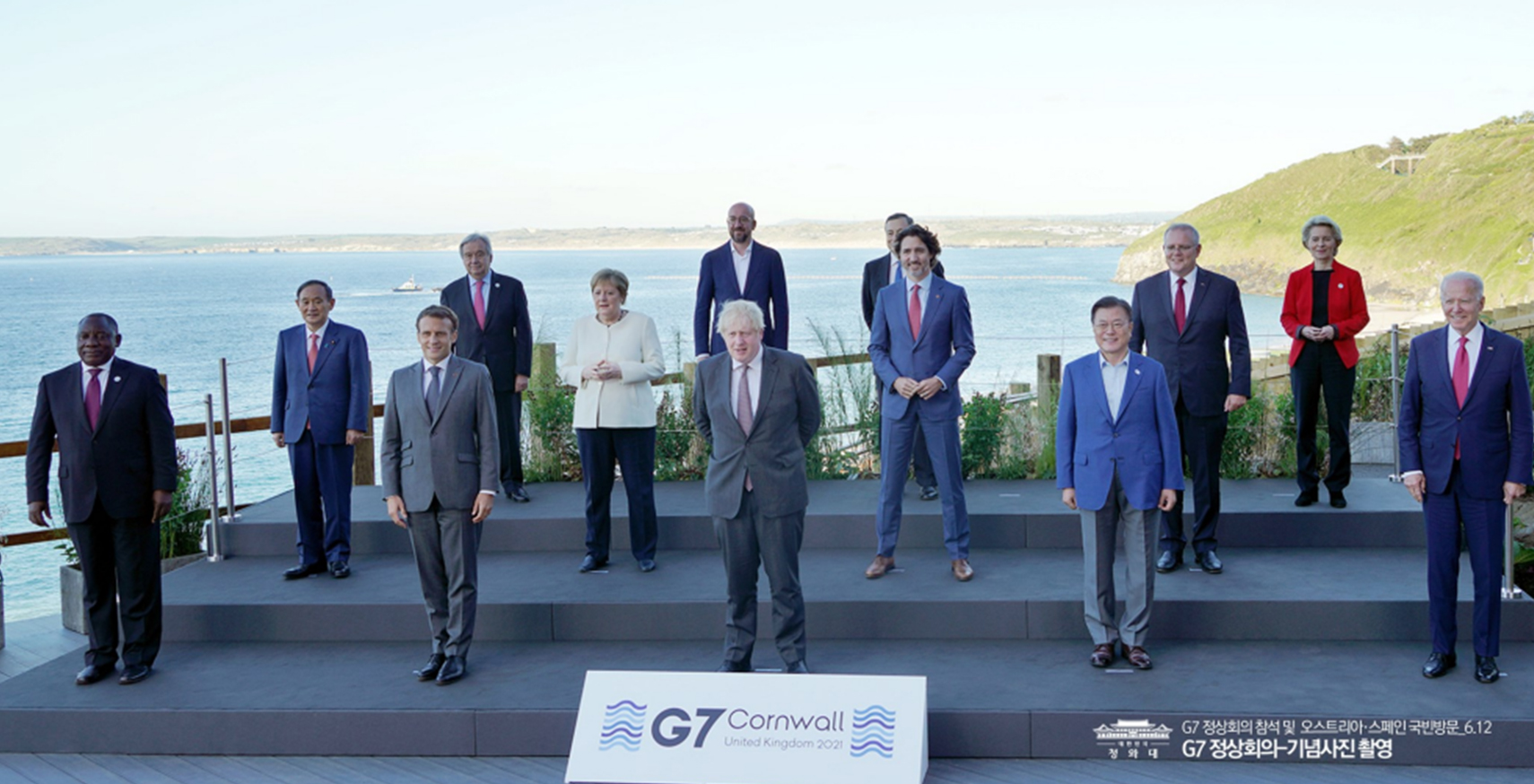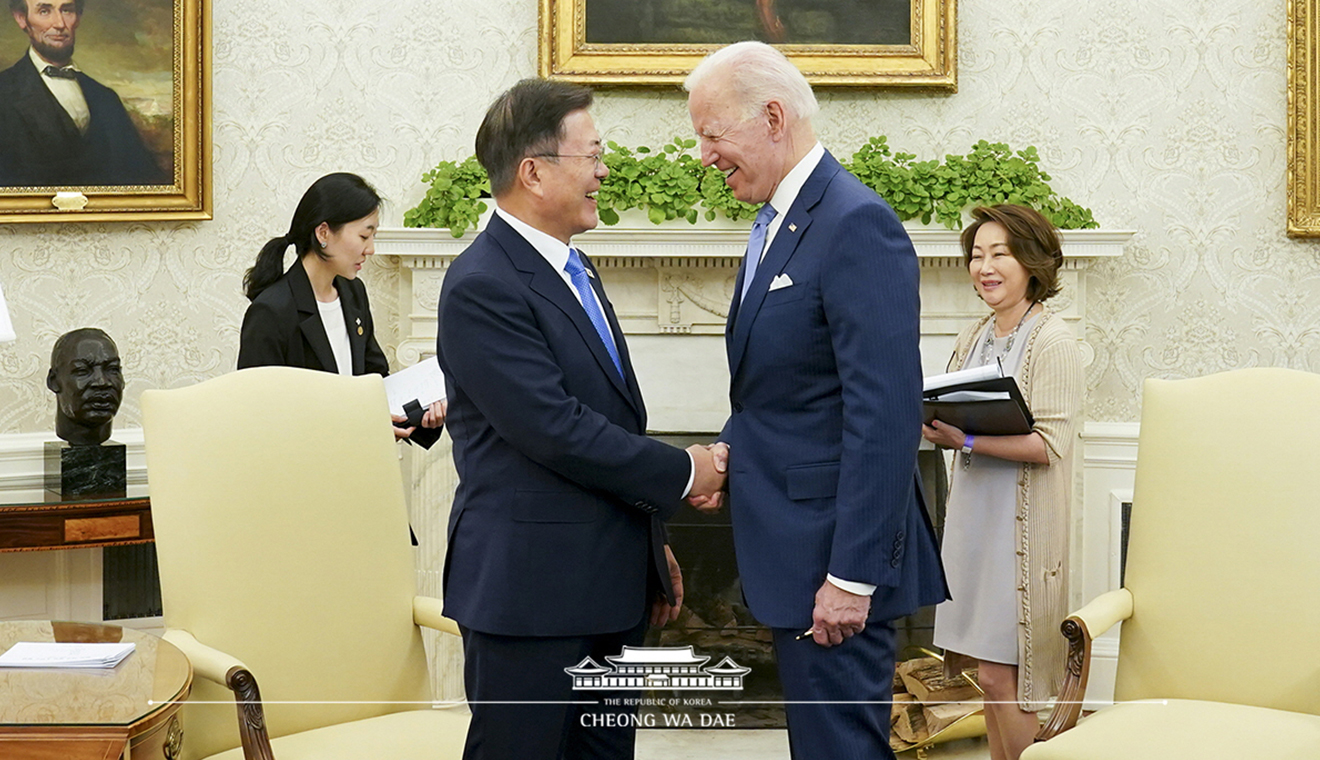July 2021

July 2021
President Moon Jae-in recently finished his first post-pandemic overseas trips to the U.S. and then Europe. The trips set the stage for him to rebuild post-pandemic relations with major economies as well as strengthen cooperation on restoring economies.
![]()
Written by
Sohn Ji-ae
Photo courtesy of
Cheong Wa Dae
 President Moon Jae-in (second from right in front row) poses with the world leaders attending the G7 summit on June 12.
President Moon Jae-in (second from right in front row) poses with the world leaders attending the G7 summit on June 12.
Video diplomacy has come to an end and face-to-face diplomacy has returned. Leaders of the world’s nations are now meeting—face-to-face—on the global stage for the first time since the spread of COVID-19 stopped them from traveling and forced them to turn to video calls.
President Moon Jae-in recently finished his first post-pandemic overseas trips, starting with the U.S. in May for a summit with President Joe Biden. Only three weeks after the U.S. trip, President Moon embarked on a three-nation European tour, first flying to the U.K. for the Group of Seven (G7) summit, followed by his state visits to Austria and then Spain.
Face-to-face meetings helped President Moon expedite discussions on shared issues with his counterparts, tackling a backlog of unsolved issues that have piled up since the onset of the pandemic. President Moon was able to boost bilateral cooperation with his allies on issues involving the economy, politics, science and technology, North Korea, and the climate crisis.
Experts see his post-pandemic trips as a “success” in that he made clear the nation’s commitment to playing a bigger role in global issues and improving strategic ties with major economies.
Among other things, vaccine diplomacy is regarded as one of President Moon’s remarkable achievements in his trips. He certainly made the most of the in-person meetings to strengthen vaccine cooperation with other countries.
His efforts paid off when he drew President Biden’s agreement on establishing a comprehensive vaccine partnership to expand the manufacture and supplies of vaccines. He also secured the U.S. government’s pledge to supply enough doses to vaccinate almost all active Korean soldiers, amounting to 550,000.
President Moon continued vaccine diplomacy in his next overseas destination, the U.K. where he joined the G7 summit as a guest, by meeting with the CEOs of leading pharmaceutical companies, including Astra-Zeneca CEO Pascal Soriot. In the meetings, the chief executive shared his vision for hosting a “global vaccine production hub” in Korea to scale up productions for not only domestic, but also global supply.
As part of an effort to reduce the global vaccine shortage, President Moon at the G7 session on health unveiled Seoul’s plan to offer USD 100 million in grants this year for the COVAX Advance Market Commitment (AMC), aiming to help developing and lower-income nations, including North Korea, access vaccines. He then pledged that the nation would provide cash or materials worth USD 100 million in additional aid next year.
 President Moon Jae-in shakes hands with President Joe Biden at the White House on May 21.
President Moon Jae-in shakes hands with President Joe Biden at the White House on May 21.
President Moon’s summit diplomacy on the economic front was widely seen as a success, too, with Korea achieving significant outcomes.
In response to the post-COVID-19 era, bolstering economic cooperation, especially on future industries, was a major focal point in President Moon’s conversations with his counterparts.
President Moon agreed with U.S. President Biden to closely cooperate in state-of-the-art sectors such as semiconductors and electric-vehicle batteries. In a meeting with Australian Prime Minister Scott Morrison on the sidelines of the G7 summit, both sides agreed to combine their own hydrogen energy output to boost hydrogen economy.
During his state visits to Austria and Spain following the G7 summit, President Moon elevated ties with the two European countries to a strategic partnership and emphasized great potential for partnerships across future industries, especially on the low-carbon and digital economy. The president was aware that stronger cooperation with the two countries—both as a global leader in industries such as eco-friendly energy, electric vehicle, and information technology (IT)—will create synergy and produce mutually beneficial results.
The return of face-to-face diplomacy began a new chapter in the post-pandemic era. President Moon’s recent overseas trips certainly helped bolster the nation’s post-pandemic cooperative ties with the U.S. and the European nations to recover from the COVID-19 crisis, both diplomatically and economically.
Amid the emerging face-to-face diplomacy, hope grows for the world leaving the difficult times caused by COVID-19 and moving forward into a new future. Following the success of the latest summits, President Moon will hopefully continue diplomatic momentum to help lift the nation, as well as the world, out of the current crisis as soon as possible.